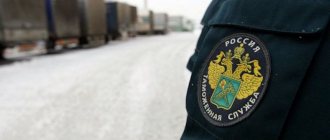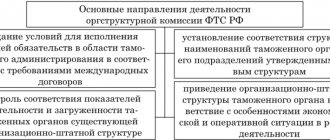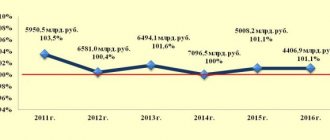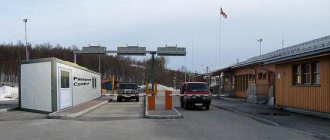1. Role of the customs service 2. Powers of customs authorities 3. Customs activities 4. Structure
The Customs Service (CS) is part of the system of executive authorities of the Russian Federation. It reports simultaneously to the Government of the Russian Federation and the Ministry of Finance of the Russian Federation. The highest level territorial unit is the Regional Customs Administration, which unites customs offices, which, in turn, unite customs posts. Institutions that support the activities of the Customs Union stand apart: information and computing centers, research units, educational institutions, foreign representative offices, etc.
The role of the customs service
There are a number of legislative acts regulating the activities of the Federal Customs Service (FCS). This indicates the extreme complexity of its design and multitasking. After the appearance of such an organization as the Customs Union on the economic map of the world, the functionality of the Federal Customs Service changed accordingly. Today, she has to be guided not only by national legislation, but also by international agreements in the customs field.
The tasks of the FCS are determined by the Customs Code of the Customs Union (CU CU), which replaced the national codified documents of the participating countries.
According to this international act, the FCS performs the following tasks:
- Implementation of the economic policy of the Customs Union;
- Ensuring the implementation of Russian laws and interstate agreements in the foreign economic sector;
- Control over the movement of items and services through the RF TG;
- Collection of customs duties and other payments, control over their completeness and terms of payment;
- Tariff regulation;
- Preventing the movement of goods and items prohibited for such movement across the customs border (CB) of the Russian Federation;
- Promoting fast and uninterrupted foreign economic supplies;
- Ensuring the national security of the Russian Federation and other member countries of the Customs Union within its competence;
- Combating violations of customs legislation;
- Protection of intellectual property rights;
- Collection of statistical data;
- Control over foreign exchange transactions;
- Export optimization;
- Providing official information and providing consulting services in their professional field;
- Implementation of the international obligations of the Russian Federation in the customs sphere;
- Scientific research in the field of customs.
Did not you find what you were looking for?
Just write and we will help
Based on the significance of specific functions, they can be main and supporting. The main functions are implemented in relation to subjects of foreign economic activity: individuals and legal entities moving goods and services through the TG of the Russian Federation. These are the fiscal function, customs control and the implementation of foreign economic policy.
Supporting functions include procedural measures of personnel, planning, financial, technical and organizational content.
Organizational structure of the customs authorities of the Russian Federation
The article examines the organizational and functional structure of customs authorities in the system of executive authorities of the Russian Federation.
Key words: customs authorities, structure, Russian Federation, executive power, public policy.
In the context of intensification of foreign economic relations of the Russian Federation, the creation of the Eurasian Economic Union (hereinafter referred to as the EAEU), as well as a single economic space, expanding the range of mutual interests of the Russian Federation and other countries in solving many problems related to the protection of the economic sovereignty and economic security of the country, becoming relevant new challenges and tasks in which the customs authorities of the Russian Federation are directly involved. This predetermines the importance and need for further improvement of the state policy of the Russian Federation in the field of customs: bringing it into line with international standards and organizing an effective system of customs authorities with a clear definition of their functions and tasks.
In accordance with Art. 351 of the Customs Code of the EAEU, customs authorities are entrusted with the implementation and provision of such tasks as:
1) protection of the national security of the EAEU member states, human life and health, flora and fauna, and the environment;
2) creating conditions for accelerating and simplifying the movement of goods across the customs border of the EAEU;
3) ensuring the execution of international treaties and acts in the field of customs regulation, other international treaties and acts that constitute the law of the EAEU, the legislation of the member states on customs regulation, as well as the legislation of the member states, control over compliance with which is entrusted to the customs authorities [1] .
Of course, the effective functioning of government bodies directly depends on their clearly constructed and organized structure. In the Russian Federation, the system of executive authorities is enshrined in Decree of the President of the Russian Federation dated March 9, 2004 No. 314 “On the system and structure of executive authorities.” The structure of executive authorities includes federal ministries, federal services and federal agencies [2]. Thus, implementing coordinating and control and supervisory functions, customs authorities are a federal service. The prerogative powers of general management in the field of customs affairs belong to the Government of the Russian Federation. At the same time, the Federal Customs Service of the Russian Federation is subordinate to the Ministry of Finance of the Russian Federation. Thus, the Ministry of Finance develops the directions of state policy and legal regulation in the field of customs, and the Federal Customs Service of the Russian Federation implements the function of control and supervision in the field of customs.
According to Article 253 of the Federal Law of August 3, 2018 No. 289-FZ “On customs regulation in the Russian Federation and on amendments to certain legislative acts of the Russian Federation,” the structural composition of the customs authorities of the Russian Federation includes 4 links:
1) the federal executive body that exercises functions of control and supervision in the field of customs affairs - the Federal Customs Service of the Russian Federation (hereinafter - the FCS of Russia);
2) regional customs departments (hereinafter - RTU);
3) customs
4) customs posts [3].
Currently, the prevailing trend is to reduce the staffing level of customs authorities: there is a reduction in customs offices and the reassignment of customs posts to larger customs houses or directly to the Federal Customs Service of Russia. This fact, of course, directly proportionally affects the efficiency of the customs authorities and centralizes the structural and organizational management of the customs authorities of the Russian Federation.
At the moment, the structure of the central apparatus of the Federal Customs Service of Russia includes 8 RTUs, 4 specialized customs departments, 74 customs houses - 4 electronic and 9 directly subordinate to the Federal Customs Service of the Russian Federation and 531 customs posts, including 2 subordinate to the Federal Customs Service of the Russian Federation.
The federal governing body - the Federal Customs Service of Russia, is a system-forming unit in the system of customs authorities of the Russian Federation, responsible for coordinating and monitoring the activities of RTUs, customs offices, customs posts, specialized customs authorities, representative offices (representatives) of the customs service of the Russian Federation in foreign countries and organizations under the jurisdiction of the Federal Customs Service Russia. The Federal Customs Service of the Russian Federation exercises powers of control and supervision, is the main manager and recipient of federal budget funds; The Federal Customs Service of the Russian Federation is authorized to conclude international agreements of an interdepartmental nature, to create, reorganize and liquidate RTUs, customs houses and customs posts [4].
The activities of the RTU are regulated by the general regulations “On the regional customs administration.” RTUs are essentially an intermediate link between the Federal Customs Service of Russia and local customs, the need for which is associated with the large size of the territories under their jurisdiction. Thus, the RTU is responsible for the coordination and control of subordinate customs authorities. RTUs ensure the implementation of the tasks and functions of the Federal Customs Service of Russia in a specific region. RTUs manage the activities of customs houses and customs posts subordinate to RTUs in the region of their activity, and forecast the receipt of customs duties into the budget [5].
The next link in the customs authorities of the Russian Federation is customs. Customs offices are divided into customs offices of actual control and electronic customs offices. RTUs exercise leadership over the activities of customs offices. Often, customs offices are directly subordinate to the Federal Customs Service of Russia. The functional component of customs is the implementation of functions in one’s region to carry out customs operations in relation to goods, placing them under one or another customs procedure; identification, prevention and suppression of offenses in customs affairs, control of the receipt and debiting of funds from the personal accounts of customs duty payers [6].
Finally, the primary link in the system of customs authorities in the range of functions applied and within the framework of the practical component are customs posts, which are under the direct supervision of customs. In some cases, customs posts may be subordinated to the RTU or directly to the Federal Customs Service of Russia. Customs posts are divided into electronic declaration centers and actual control posts. Currently there are 16 EDCs in the country. Thus, the functions of customs posts include carrying out customs control taking into account the risk management system, performing customs operations in relation to goods related to their placement under the definition of the procedure; within the framework of the movement of goods across the customs border - ensuring compliance with prohibitions and restrictions; conducting various examinations and studies; collection of customs duties; initiating cases of administrative offenses, conducting investigations into them, as well as considering these cases [7].
Thus, it can be stated that the customs authorities of the Russian Federation have a clearly structured management apparatus and are an important structural component in the overall system of executive authorities. The functions of customs authorities coincide with the functional component of other federal executive authorities. The main difference between the customs authorities of the Russian Federation and other executive authorities is that customs authorities carry out customs operations and carry out customs control in relation to goods and vehicles moved across the customs border of the EAEU.
Literature:
- Customs Code of the Eurasian Economic Union (Appendix No. 1 to the Treaty on the Customs Code of the Eurasian Economic Union). The document was not published in this form. Access from the reference legal system "ConsultantPlus".
- On the system and structure of federal executive bodies: Decree of the President of the Russian Federation dated March 9, 2004 No. 314 (as amended on April 12, 2021). The document was not published in this form. Access from the reference legal system "ConsultantPlus".
- On customs regulation in the Russian Federation and on amendments to certain legislative acts of the Russian Federation: Federal Law of August 3, 2021 No. 289-FZ (as amended on May 1, 2019). The document was not published in this form. Access from the reference legal system "ConsultantPlus".
- On the Federal Customs Service: Decree of the Government of the Russian Federation dated September 16, 2013 No. 809 (as amended on June 3, 2019). The document was not published in this form. Access from the reference legal system "ConsultantPlus".
- On approval of the General Regulations on Regional Customs Administration: Order of the Federal Customs Service of Russia dated May 31, 2021 No. 832 (as amended on June 3, 2019). The document was not published in this form. Access from the reference legal system "ConsultantPlus".
- On approval of the General Regulations on Customs: Order of the Federal Customs Service of Russia dated May 31, 2021 No. 833 (as amended on August 30, 2019). The document was not published in this form. Access from the reference legal system "ConsultantPlus".
- On approval of the General Regulations on the Customs Post: Order of the Federal Customs Service of Russia dated May 31, 2021 No. 834 (as amended on February 6, 2019). The document was not published in this form. Access from the reference legal system "ConsultantPlus".
Powers of customs authorities
In order to fulfill its tasks, the FCS is endowed with the corresponding rights and responsibilities. At the same time, it is difficult to separate official rights from official duties, which is why in science it is customary to combine them into one concept - powers.
The powers of the Federal Customs Service include:
- Request for documents that must accompany the movement of goods and services through the TG;
- Checking the identity cards of participants in customs operations;
- Verification of documents confirming authority to move items through the TG;
- Carrying out operational investigative activities in order to prevent and disclose offenses in the customs sphere;
- Investigation and inquiry;
- Bringing customs regime violators to administrative responsibility;
- Paid seizure of communications and transport means of any organizations in order to suppress offenses;
- Detention and delivery of customs regime violators;
- Documentation, photography and video recording of events related to the movement of objects through the TG;
- Apply to the courts in order to protect the interests of the state.
All links in the customs authorities system solve the same problems, each at its own level and in its own area of responsibility.
Within the limits of their powers, customs authorities are engaged in the following activities:
- Law-establishing, aimed at issuing normative acts;
- Law enforcement, which consists in the practical implementation of legal norms;
- Law enforcement, the essence of which is to protect the interests of society and the state from encroachment.
A characteristic principle of the activities of customs authorities is the combination of centralization and decentralization. In the first case, we are talking about the strict subordination of all parts of the customs authorities to a single Federal Customs Service, in the second - about consolidating the scope of competence of each lower-level unit.
Class ranks in the Federal Customs Service
According to Art. 11 of the Federal Law of July 27, 2004 No. 79-FZ “On the State Civil Service of the Russian Federation”, the following class ranks of the state civil service are established in Russia. All state civil servants who do not have a special rank of the Federal Customs Service of Russia are assigned the class ranks of the state civil service:
Highest group
- Actual State Advisor of the Russian Federation, 1st class;
- Actual State Advisor of the Russian Federation, 2nd class;
- Actual State Advisor of the Russian Federation, 3rd class;
Main group
- State Councilor of the Russian Federation, 1st class;
- State Councilor of the Russian Federation, 2nd class;
- State Advisor of the Russian Federation 3rd class;
Leading group
- Advisor to the State Civil Service of the Russian Federation, 1st class;
- Advisor to the State Civil Service of the Russian Federation, 2nd class;
- Advisor to the State Civil Service of the Russian Federation, 3rd class;
Senior group
- 1st class assistant of the state civil service of the Russian Federation;
- assistant of the state civil service of the Russian Federation, 2nd class;
- 3rd class assistant of the state civil service of the Russian Federation;
Junior group
- Secretary of the State Civil Service of the Russian Federation, 1st class;
- Secretary of the State Civil Service of the Russian Federation, 2nd class;
- Secretary of the State Civil Service of the Russian Federation, 3rd class.
The ratio of ranks and titles is established by Decree of the President of Russia dated February 1, 2005 No. 113 “On the procedure for assigning and maintaining class ranks of the state civil service of the Russian Federation to federal civil servants” and Decree of the President of the Russian Federation dated January 14, 2011 No. 38 “Issues of the activities of the Investigative Committee Russian Federation" (as amended in accordance with Decree of the President of Russia dated September 30, 2013 No. 744).
Customs activities
Customs posts as lower structural units of the Federal Customs Service are located in the TG that coincides with the state border. The number of posts in a certain area is related to the volume of goods moved across a given section of the border, passenger traffic, the development of foreign economic contacts, the development of transport corridors and the needs of participants in foreign economic activity.
The Federal Customs Service is endowed with property in the form of land, real estate, and state-owned enterprises, and its financing comes from the federal budget. Customs authorities have the status of legal entities.
The Federal Customs Service is not only an executor of state policy, but also a subject of the rule-making process: it develops draft decisions, documents and regulatory instruments in ensuring the customs regime, combating smuggling and other offenses. This service is responsible for ensuring the uniform application of customs legislation and generalizing relevant practice.
In addition to customs control, the FCS is vested with organizational powers to reorganize and liquidate subordinate customs bodies, approve regulations on its structural divisions, create collegial bodies, develop official documents and certificates. But the main activity of the FCS remains customs control and fiscal functions that have an external focus, i.e. spreading to an unlimited number of persons not subordinate to the Federal Customs Service.
The internal functions of the Federal Customs Service are of a supporting nature. This includes professional training of customs officers, improvement of means and methods of combating violations of the customs regime, advanced training, procurement of goods and services necessary for the needs of the Federal Customs Service, etc.
Special ranks of the Federal Customs Service
Special ranks of the Federal Customs Service of Russia are awarded to citizens of the Russian Federation recruited to serve in the customs authorities, and to employees of the customs authorities of the Russian Federation (Federal Law of July 21, 1997 No. 114-FZ “On Service in the Customs Authorities of the Russian Federation”). The special ranks of customs authorities generally repeat the military ranks in the Armed Forces of the Russian Federation, with the exception of the absence of sergeants and privates and the presence of an additional rank in the highest command. Due to the fact that the Federal Law “On Military Duty and Military Service” dated March 28, 1998 No. 53, it is established that for persons who are not military personnel, it is prohibited to introduce special ranks or class ranks similar to military ranks, all special ranks contain the words "customs service".
Senior management
- Acting State Advisor of the Customs Service of the Russian Federation
- Colonel General of the Customs Service
- Lieutenant General of the Customs Service
- Major General of the Customs Service
Senior command staff
- Colonel of the Customs Service
- Lieutenant Colonel of Customs Service
- Major of the Customs Service
Middle management
- Customs Captain
- Senior Lieutenant of the Customs Service
- Customs Lieutenant
- Junior Lieutenant of the Customs Service
Junior squad
- Senior Warrant Officer of the Customs Service
- Ensign of the Customs Service







